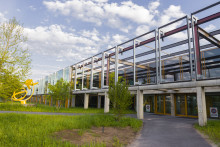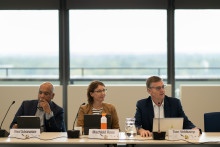Which interventions will your faculty or service use to make budget cuts? In what way was the decentral participation involved? And what does the situation look like with regard to temporary contracts? These are just a few of the questions that U-Today sent to all deans and department heads at the end of February. This is in view of the date of 1 March. After all, it had to be clear how the faculties and services are going to make cuts this year – as the Executive Board and the University Council agreed in December. In this way, U-Today wanted to find out where the emphasis on austerity is placed.
'Not completed'
Of the nine service departments and five faculties, one faculty – ITC – provided answers to the questions posed. The rest responded collectively through spokesperson Laurens van der Velde. ‘Because [the faculties and service departments] are tackling the cuts together, they feel it is important to respond together'.
Van der Velde says that 'at the moment it is still a bit early to be able to go into more detail about the initiatives as they are being taken within the UT'. 'It has been agreed with the University Council that by 1 March there will be clarity about the details of the various measures and the possible effects, and that the faculty and service councils will be actively informed about this. That inventory is currently ongoing, but has not yet been completed.'
Bi-monthly monitor
The spokesperson expects a first bi-monthly monitor of the 'redirection task' to be published at the end of March. This should provide more insight into the financial measures. Van der Velde cannot give a complete picture of the situation regarding temporary contracts. 'This is an ongoing process, in which we are constantly looking at the contracts that expire in the coming months. Because many factors can play a role in the decision about whether or not to renew, it is not the case that we can already indicate whether or not all expiring contracts will be extended. Managers are very familiar with the working agreements we have made and also discuss them with the employees concerned.'
Measures ITC
That is about as far as the replies from the majority of faculties and all service departments go. What does the financial picture look like at ITC? David Korringa, portfolio holder for operational management at the faculty, gave a detailed answer. According to him, ITC follows the general guidelines of the UT with regard to hiring and lunches, among other things. Since March 2023, the faculty has also taken additional measures, 'such as taking a critical look at replacing departing staff, reducing student assistants (especially at Pre-U), limiting travel on the first flow of funds, limiting outsourced work in projects and transferring classrooms to the central educational facilities earlier.'
According to Korringa, ITC has also been focusing for some time on working more efficiently, increasing the funding contribution and accelerating PhD trajectories. Korringa states that all plans were drawn up in consultation with all heads of the scientific and support departments. The faculty council has also been 'periodically informed of developments, both at UT and faculty level'. The same faculty council approved the ITC budget, 'but with concerns'.
Temporary contracts
According to Korringa, the faculty had seen the 'financial challenges' coming for some time, due to the energy crisis, collective labor agreement wage increases and inflation, among other things. That is why ITC has been using a so-called 'temporary hiring limitation' since the beginning of 2023. 'This means that we are critical of the renewal, replacement and opening of new vacancies and that we only do this if they are 100 percent financially covered and/or essential,' says Korringa. According to him, these are not positions that are temporary by nature, such as postdocs and PhD candidates. 'Because those contracts always expire and it's not an option to extend them.'
According to Korringa, ITC has 'room' for the period up to and including 2028 in terms of temporary contracts and natural progression of contracts through retirement. ITC employs about 270 FTEs. In the coming years, 23 people will be approaching retirement age, and there are also about 75 PhD and postdoc positions and eight sector plan positions that will initially be given temporary appointments. In addition, Korringa speaks of a dozen other temporary contracts. 'It does not mean that these positions will not be replaced, but it does mean that there is flexibility,' says the portfolio holder for operations.
Legislation
When asked about the possible challenges or bottlenecks with regard to the budget cuts, Korringa said that some austerity targets are difficult to achieve due to regulations. Specifically, he mentions the full use of vacation days. 'Together with the HR department, we paid a lot of attention to this, especially regarding the well-being of employees. But due to the collective labor agreement, an employee cannot be obliged to use up all their vacation days in a financial year.'
Korringa also points to a lack of clarity and unrest surrounding the upcoming internationalisation legislation. ‘We notice that our faculty, which is known for its diversity, inclusiveness and multicultural values and norms, is concerned about the developments surrounding the Internationalisation in Balance Act and the political shifts. This affects the well-being of staff and students. As a faculty board, we pay a lot of attention to this and try to remain calm.'







